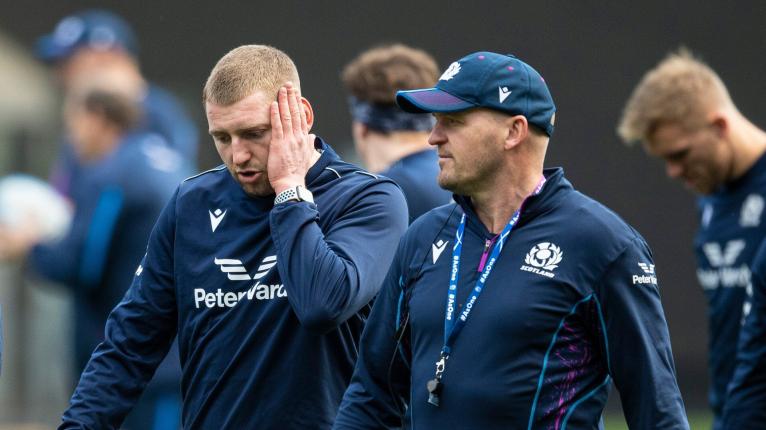Mercurial Scotland number 10 Finn Russell has been through the wringer with Gregor Townsend. He has been in, he has been out, he has been round-about. If there has been one certainty about their working relationship as player and coach, it is that nobody can truly predict the next twist in the tale.
Even after the emphatic 35-7 win over hapless Wales last Saturday at Murrayfield, the Saltires play-maker noted that since last November, he and Townsend “have kept that relationship good. It’s easy, but it can fall apart quickly if that makes sense.” In one breath there is an effortless unity of purpose, in the next a sudden tsunami of disagreement can all blow up in the faces of both player and coach. It is that kind of unpredictable dynamic.
Russell memorably walked out of a Scotland training camp before the 2020 Six Nations and remained in exile for the whole tournament. The pair mended some fences during the long Covid limbo period but Russell was again dropped for the 2022 November series, and only got the call to return when Adam Hastings was injured. It is an odd situation for a player who probably deserved to start all three Tests with the British & Irish Lions in South Africa in 2021.

Even on a recent Rugby Pod episode with Jim Hamilton and Andy Goode, Gregor Townsend sent out some mixed messages when he was invited to voice his thoughts out loud about a man who shares so many of his own characteristics as an outside half:
“It’s interesting, I do get asked a lot about the relationship with players, and someone like Finn.
“We thought of the form he was at in the beginning of the season and the end of last season, and the form that Adam Hastings was in, [and it] meant that we selected Adam.
“Finn responded really well with his club [Racing 92 in Paris] and in particular when he came into camp. He was highly motivated. He was in great physical shape.
“He’s always very enjoyable to work with, very easy to work with. He knows the game, when he comes into camp he studies things. He leads on our attack and then when you watch him train you see what skill-set he has got and it’s great to watch.
“I think of Stuart Hogg and Finn Russell, it’s a joy to watch them train; their passing accuracy, the speed at which they can play at. In terms of working with Finn, it’s always been very easy to work with him during the training week.
“I now believe he is at a very important time of his career where he can see the game quickly. He can understand pictures. He has that experience of playing at 10 for over 10 years now and physically he’s in good shape, so he can deliver or take those opportunities that he knows are going to come at some point.”
There were a few things I may not have been happy with, or [Townsend] might not have been happy with.
Russell on his previous stints in the Scotland set-up
Given the glowing tribute in those last three paragraphs, you would have to rub your eyes to convince yourself that Finn Russell has ever been dropped for Adam Hastings, let alone Blair Kinghorn. Hastings has yet to prove himself at Test-worthy number 10 and Kinghorn has returned to the back three, where he truly belongs, after a brief flirtation with the outside-half berth last summer.
Here is Russell’s view of the same events from the other side of the fence:
“When he [Townsend] asked me in November about coming back in after Hasto [Adam Hastings] got injured, I said I was keen but I needed to chat through a few things before I came back in.
“There were a few things I may not have been happy with, or he might not have been happy with.
“It wasn’t a case of clearing the air, it was more about us getting back on the same page and being open and honest with each other as to where he is at mentally with his gameplan and how he wants things to run, and me having my input and saying what I think as well. The best thing is both of us being on the same page and that allows us to play as we did.”

Russell’s return has probably also coincided with Gregor Townsend re-gripping the Scotland gameplan, which had become more conservative and attritional, what with Steve Tandy taking charge of the Saltires’ defence after the last World Cup. Scotland have gone on the attack again, and the choice of Huw Jones at number 13, rather than defensive expert Chris Harris, is symbolic of a strategic shift which has brought Finn Russell back into the fold.
It is also a more mature Russell who has reappeared on the national radar, a coming-of-age which the player himself succinctly puts down to events off the field: “having a baby and my partner falling pregnant”.
The old Russell could be rattled, to the point where he might shirk some of the dirty tasks to which every professional player has to devote his full-time concentration. Pressure could lead him to drift into treacherous mental waters, and out of the flow of a game.
That is not the case now. When he makes mistakes, more often than not his head stays in the game and he moves on more seamlessly to the next job. It is called ‘composure’, and it is why Russell’s performances in the second periods of both of Scotland’s first two games have improved dramatically. Take a look at the following table describing the key Finn Russell events from the match at Twickenham in the first round:

In the first 38 minutes of the game, there were four clear negative outcomes set against one positive. From the 39th minute onwards, the situation was transformed, with 10 positive involvements far outweighing two kicks into touch on the full.
It was very much the same pattern in the second round versus Wales, with a -3 ratio in the first half turned on its head, to +8 after oranges. That second half at Murrayfield contained a massive seven break or try assists by the Bridge-of-Allan native.
England began the game with a definite idea to pressure Russell physically whenever possible, especially via the rugby warrior that is Owen Farrell (complete with headband) from number 12:
England correctly identified the key scenarios in which they could get to Finn Russell. The first two occurred when he was in backfield defence, and paired with his long-time comrade-in-arms Stuart Hogg.
These are situations where Russell has historically either tended to overplay his hand on the counter (offloading in the first example) or struggled with the mundane tasks of clearing up messy ball on defence. In the second instance, he gets up off the floor after a bump from Lewis Ludlam only to miss Max Malins’ kick through, and that puts Hogg under intense pressure behind him.
England also saw the opportunity to create defensive momentum through Russell’s desire to make play close to the advantage line:
The mercurial fly-half tends to leave his decision-making – whether to run, pass or kick – until the very last moment, and that paints a target on his back for Farrell in both clips. Farrell reminded Russell of his presence in no uncertain terms after both events.
That might have been enough to persuade the old Finn Russell to dwell on his mistakes and boot him out of the game psychologically. Not so the new version. The transition-phase back to ‘playing what’s in front of you’, pure and simple, was fascinating. It was accomplished not with spectacular, sweeping gestures on attack, but by a series of small wins in what coaches like to call ‘the controllables’ of the game.
There were three super-accurate restarts after England scores which resulted either in Scotland turnovers, or drove the Saltires back on the front foot:
In the first instance, Scotland wins the ball back directly on the England 22. In the second, the length of the kick forces indecision between England number 8 Alex Dombrandt and the forward pod in front of him on the receipt. This was Finn Russell, leading Scotland back into the thick of the fray immediately after his comrades had been wounded.
Russell also got himself back in the mental flow by performing the down-and-dirty tasks well, via goal-line saves and long placements at the tackle:
The situation after two England kicks through deep into the Scotland 22 is a one fraught with danger, but Finn Russell drops back from his defensive spot in the 13 channel to sweep up with dustpan and brush. Then he resists the temptation to throw the big speculator in backfield play after another England kick, and a beautifully-long presentation at the tackle forces Ben Earl to over-extend in his attempt to win the ball back.
These are the little actions of a man whose head is still very much in the game. Take those baby steps, and the spectacular will arrive of its own accord, unbidden:
It is the 74th minute of the match, and Finn Russell is still attacking aggressively, making play right on the advantage line less than one metre from the tackler; passing long off left and right hand alike, finding those vulnerable transition zones between forward and back – first Maro Itoje and Joe Marchant going right, then Owen Farrell and Mako Vunipola moving left on the scoring play.
Like his mirror-image in the Southern Hemisphere, Australian Quade Cooper, Finn Russell has discovered off-field maturity, and demonstrated true world-class quality on it at the start of his thirties. In the process, he has drawn closer to his vraisemblance and nemesis on the Scotland coaching staff, Gregor Townsend. Gregor has moved the game plan back towards Finn’s strengths, and Russell has repaid him, not just with the big plays and miracle passes, but with his ability to stand strong in the storm and get the small details right when the pressure comes on.
He is now a real leader of the team:
Ten seconds before the final whistle is blown, and all Scottish heads turn to follow Finn Russell. He is now the man who will beckon his teammates over the finish line, and there can be no higher compliment.


Great breakdown of his development and maturity. Thank you